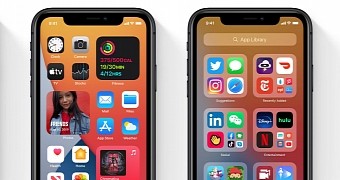Apple has recently released iOS 14.0.1 with one very important fix, and devices who are updated to this new version are now blocked from going back to the original version of iOS 14.
In other words, once you installed iOS 14.0.1, you can no longer downgrade to iOS 14, as Apple has stopped signing this version of the operating system.
Theoretically, there’s no good reason to want to go back to iOS 14 anyway.
Version 14.0.1 introduced a bug fix that now makes it possible to permanently change an app default on an iPhone. The original version of the OS also allowed users to do this, but the changes were lost after the device was rebooted.
As long-time Apple users probably know, the Cupertino-based tech giant allowing us to change the default apps on an iPhone is something that was pretty difficult to imagine several years ago. And it’s all because Apple has developed an obsession for its walled garden, setting up a lot of restrictions that prevent users from doing a lot of things.
On the other hand, Apple says this approach translates to increased security and privacy, which is exactly what iPhone users are looking for in the first place.
More bug fixes
Getting back to iOS 14, the new version also included additional camera improvements for owners of the iPhone 7 and iPhone 7 Plus, as Apple discovered that the previews no longer showed up on these devices. In addition, the update resolves a problem blocking some devices from connecting to wireless networks, so overall, version 14.0.1 should provide a generally more refined experience.
The downgrades to iOS 13 would also be blocked at some point in the future, so think twice before you install the new OS version on your iPhone.

 14 DAY TRIAL //
14 DAY TRIAL //